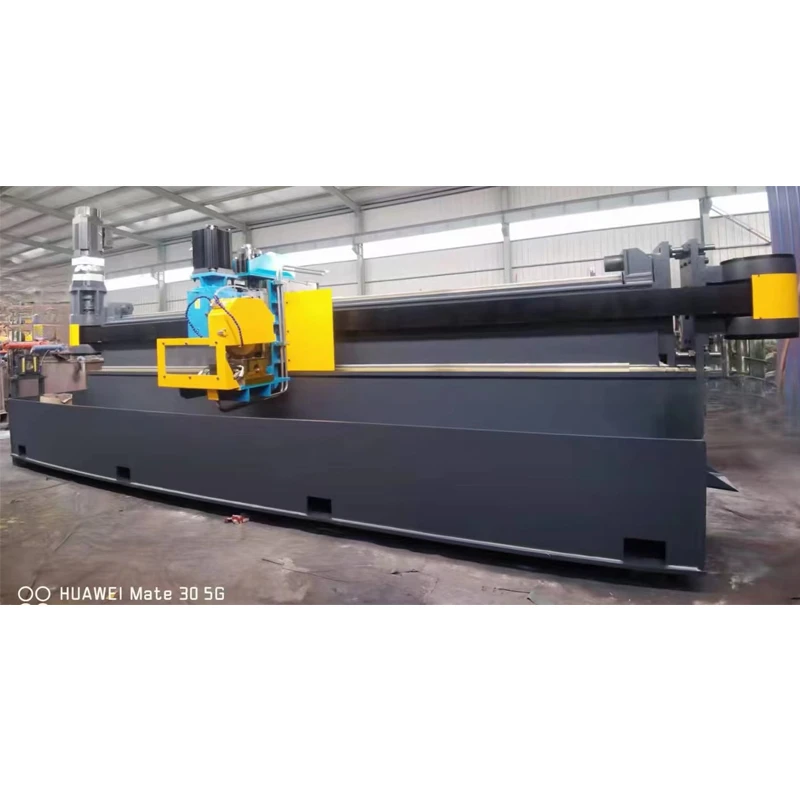C-Profile Roll Forming Equipment for Efficient Metal Structure Production
The C-Profile Roll Forming Machine An Overview
In the world of metal fabrication, the C-profile roll forming machine stands out as an essential piece of equipment for producing high-quality C-shaped profiles. These profiles are widely used in various industries, including construction, automotive, and manufacturing, due to their strength, lightweight, and versatility. In this article, we will explore the C-profile roll forming machine, its working principles, applications, and benefits.
Understanding the C-Profile Roll Forming Process
Roll forming is a continuous bending operation in which a long strip of sheet metal is passed through consecutive pairs of rolls. Each pair of rolls is designed to incrementally shape the metal into the desired profile. The C-profile roll forming machine is specifically designed to create C-shaped sections from flat metal strips.
The process begins with feeding a flat metal sheet into the machine. As the material moves through the various stages of the rolls, it is gradually shaped into a C-profile. The machine typically consists of several components, including
1. Feed Mechanism This part ensures that the metal sheet enters the machine consistently and at the right speed. 2. Roll Forming Stations These stations contain the rolls that gradually bend the metal into the desired C-shape. The number of stations can vary depending on the complexity of the profile required. 3. Cut-off Mechanism Once the C-profile reaches the desired length, a cut-off mechanism is employed to slice the profile from the continuous strip. 4. Control System Modern roll forming machines are equipped with advanced control systems for precision and efficiency. These systems allow operators to adjust the speed, temperature, and other parameters for optimal performance.
Applications of C-Profiles
c profile roll forming machine

C-profiles are integral to a variety of construction and manufacturing applications. Some common uses include
- Structural Support C-profiles are often utilized in the construction of buildings and structures as beams and columns because of their high strength-to-weight ratio. - Frames These profiles can be used to create frames for windows, doors, and other structures, providing necessary support while remaining lightweight. - Automotive Industry C-profiles are essential in the manufacturing of car frames and other structural components, contributing to vehicle safety and performance. - Display and Racking Systems Retail environments often utilize C-profiles for shelving and display systems due to their durability and adaptability.
Benefits of Using a C-Profile Roll Forming Machine
Investing in a C-profile roll forming machine presents several advantages for manufacturers
1. Efficiency The roll forming process allows for continuous production, which significantly reduces manufacturing time compared to other forming methods. 2. Precision With advanced control systems and high-quality rolls, manufacturers can achieve precise dimensions and consistency across production runs. 3. Material Optimization Roll forming minimizes waste, as the entire sheet can be utilized efficiently by producing long lengths of C-profiles from narrow strips. 4. Versatility C-profile roll forming machines can be tailored to produce a variety of C-profile sizes and gauges, making them suitable for different applications. 5. Cost-Effectiveness The efficiency and reduced waste lead to lower production costs over time, making C-profile roll forming an economically viable option for many businesses.
Conclusion
The C-profile roll forming machine is a vital tool in the metal fabrication industry, providing manufacturers with the ability to create robust, lightweight C-shaped profiles that are essential in various applications. With its high efficiency, precision, and versatility, the roll forming process has firmly established itself as a preferred method for producing C-profiles. As industries continue to evolve, the demand for advanced roll forming technologies, including the C-profile roll forming machine, will undoubtedly grow, driving innovation and efficiency in metal fabrication.
-
High Frequency Straight Seam Welded Pipe Production Line-BzZhou Xinghua Machinery Equipment Manufacturing Co., LTD.|line pipe steel&welded gas pipeNewsJul.30,2025
-
High Frequency Straight Seam Welded Pipe Production Line-BzZhou Xinghua Machinery Equipment Manufacturing Co., LTD.|High Precision&Automated SolutionsNewsJul.30,2025
-
High Frequency Straight Seam Welded Pipe Production Line - BzZhou Xinghua Machinery Equipment Manufacturing Co., Ltd.NewsJul.30,2025
-
High Frequency Straight Seam Welded Pipe Production Line-BzZhou Xinghua Machinery Equipment Manufacturing Co., LTD.|Precision Welding, High EfficiencyNewsJul.30,2025
-
High Frequency Straight Seam Welded Pipe Production Line|BzZhou Xinghua|Precision Welding&EfficiencyNewsJul.30,2025
-
High Frequency Straight Seam Welded Pipe Production Line - BzZhou Xinghua|Precision Engineering&EfficiencyNewsJul.30,2025


